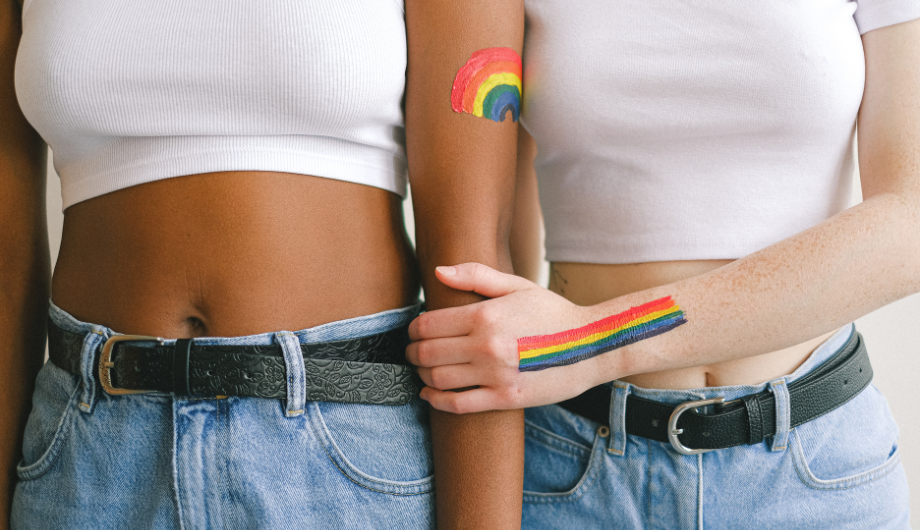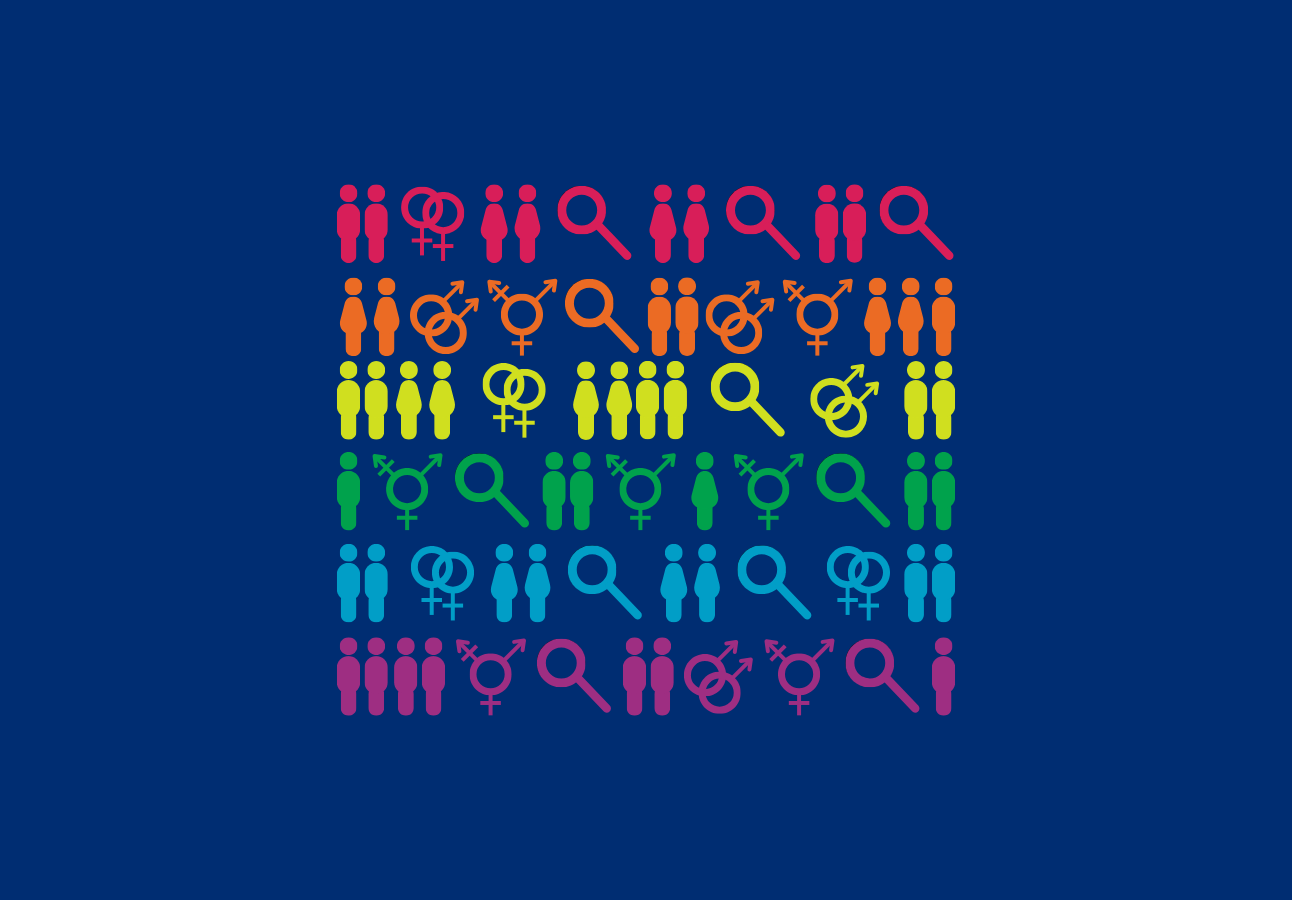
Understanding sexuality and gender discrimination: Poppy Freeman interviews
In this interview, SafeLives Knowledge Hub Advisor Collette Eaton-Harris speaks to Poppy Freeman, an intake and assessment worker at a domestic abuse charity. Poppy also holds an MA in gender, sexuality and culture from Manchester University.
Collette: Welcome Poppy. So we’re here today to talk about sexuality and gender discrimination. Can you start by explaining why you think it’s important to think about gender and sexuality separately?
Poppy: Yes, so we’re going to talk about LGBT, and within that you’ve got lesbian, gay, bisexual and transgender. The LGB refers to sexuality and then transgender is referring to gender – and that is something completely separate. So ‘transgender’ is a term referring to someone whose gender identity doesn’t match the biological sex they were assigned at birth, and within transgender communities there are people who identify as ‘gender fluid’, which means their gender identity doesn’t fit into the binary model of male or female.
We tend to talk about sexuality as something that refers to the gender you’re attracted to, whether that’s physically or emotionally. Gender is a completely separate term, and it’s often argued that gender is something which is socially constructed. It’s usually seen as two opposing categories (male and female), and that’s seen as relating to a person’s biological sex. So if you’re born with certain sex organs you’ll be referred to as male, and if you’re born with certain other sex organs you’ll be referred to as female.
Collette: And so historically service providers have tended to put services together for both gender and sexuality, are you able to say a bit about why that is?
Poppy: I think that as minority groups they tend to be grouped together, in order to recognise that everyone within these communities are facing discrimination. But it is something that I think it’s important to move away from slightly – we need to think about how we help people in transgender communities, and the way we help them will be different to the ways we help people from LGB communities.
Collette: So it’s useful for individuals in those groups to gain support from each other, but it’s not useful as service providers to generically treat everyone under that umbrella the same. Could you talk a bit more about the notion of gender being socially constructed?
Poppy: So within equality movements, especially feminism, debates about gender started coming from I’d say about the 1970s. There started being ideas about gender being something that society creates. There’s a famous sociologist called Ann Oakley, who wrote about and researched around gender construction. She found that the minute a baby is born we’re already gendering them, we’re teaching them how we think they should act according to what gender we’ve assigned them. For example dressing baby girls in pink and dressing baby boys in blue.
People will handle babies differently; they might pick them up and be a bit more rough if it’s a boy or if the baby is dressed in blue. Also how we speak to children: how we talk to girl children could be calling them a princess, with boy children we tend to do things like calling them strong, or telling them not to cry.
We’re constantly being given these messages about our role in terms of gender, and we learn that there are consequences if we don’t comply with that, if we’re acting outside of the gender we’re assigned at birth. For example little boys who want to wear dresses being told that they can’t, maybe at home or at school, things like that.
Collette: So how does it help in terms of our practice then to understand this, and just how strong those gender messages are?
Poppy: I think not just for practitioners but also in wider society, it’s showing us that gender isn’t something that’s innate that we’re born with – it’s ever changing, it’s evolving, and it’s something that we are socialised into. So this is where we start to talk about transgender and how this can open our eyes to try and understand people in transgender communities. Because if we’re saying that, ok I’ve been assigned female at birth and I identify with that, but then you might find someone else who is assigned female at birth, and they are socialised into that role, but they don’t feel like that is their gender – then that’s just a really interesting way of looking at things and opening our minds to thinking ok, gender isn’t something fixed, it’s not something rigid, it’s something that humans create themselves, not biological.
Collette: So another term that people may have heard is the term ‘cisgender’. Can you explain a bit more about what cisgender is?
Poppy: So cisgender is used to describe people who identify with the gender assigned to them at birth, so I was assigned female at birth and I identify as female, so therefore I am a cisgender female. And it’s used in opposition to the word trans. I think another phrase you might hear is ‘cis-normative’, and that’s often used as a way to talk about discrimination against people in transgender communities. What it basically means is you’re assuming that everyone is cisgender, and that that’s the right way to be, and anyone outside of that is abnormal, or is going against social norms.
Collette: So that could be a very explicit and mindful discrimination, but I guess it could also be inadvertent discrimination out of ignorance? So creating forms that push people to choose either male or female as their gender.
Poppy: Yes I think largely it will be unconscious because we are so used to just thinking of everyone as being cisgender, so yes it could be tick boxes on forms. When we’re talking about domestic abuse, it’s the assumption that most of our clients will be cisgender female, and the fact that the majority of domestic abuse practitioners are cisgender female as well.
Collette: Another term that’s similar to cis-normative is heteronormative, could you say a bit about that?
Poppy: Yes so heteronormative means assuming everyone is heterosexual, that it’s the normal way of being, and that if you’re not heterosexual that it’s not normal or not right. So when I ask someone what their sexuality is and they say ‘normal’, I always challenge that and say ok, what is normal, what does normal mean to you? And it’s getting people to reflect on that and think actually, maybe it’s not ‘normal’ maybe it’s just my way of being.
Collette: And the important point here is that really big, important documents, rules and legislation have been written in a way that there’s been no consideration of anything other than this heterosexual norm.
So having talked about cis-normativity and heteronormativity, with that background and the discrimination and oppression that LGB or T people are experiencing in general, how does that then feed into the experience of domestic abuse?
P: I think because people in LGBT communities are already at increased risk of physical violence, of impacts on their physical and mental wellbeing, and the potential to create greater vulnerability, then if you identify as LGB or T then that’s going to be further added to by being in an abusive relationship or having been a victim of domestic abuse.
Something that I won’t go into too much detail about now but that people can go and look at is the Trans Murder Monitoring Project, and that’s a research project done by TGEU and it records reported murders of trans people internationally. The statistics are tiny in comparison to the real number because it’s only reported deaths, but it’s really interesting to give people an idea of just how many trans people are murdered. I think just having that in mind – the greater vulnerability and the risk of violence to anyone within the LGBT community and in particular trans people.
And there’s also another element to that which would be if you identify as LGBT, but you’re in a relationship with someone who doesn’t identify as LGBT, then that person will have more power than you in society; they’re more likely to be taken seriously by people you normally come into contact with when we’re talking about domestic abuse. And they can use that power to exploit their victim. So that’s another way that they can be abusive.
Also something that can be really common is a cisgender person being in a relationship with a transgender person, and purposely using the wrong pronouns – so saying ‘he’ for a transgender woman and calling them by a name that they don’t go by. That’s obviously hugely emotionally abusive and is going to have a huge impact on that person.
So a person’s LGBT status can massively affect a victim’s ability to seek support for domestic abuse, and leaving the relationship. It may be that they fear discrimination from support agencies. I think there’s also a lot of myths about domestic abuse only occurring in cisgender heterosexual relationships, which obviously as we know from the statistics just isn’t true.
So I think all of those issues are really important, and that’s why the experience of domestic abuse, if you identify as LGB or T is very different from if you don’t identify in that way.
You may also be interested in

LGBT+ survivors and mental health

